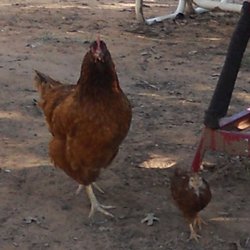Winter Chicken Care
Winter chicken care is something you may worry about if you live in a colder climate. You raised your lovely birds from chicks and now you're worried: will your brood freeze to death in the bitter cold?
Such worry is normal when caring for chickens. The good news is that chickens are a lot tougher than you think.

If you live in an area where winters are mild, all you'll have to do is provide shelter from rain and wind, make sure to provide them with fresh water daily, and your flock should be fine.
Chickens can handle very cold temperatures. If it doesn't get too low in the subzero temperatures, your chickens should be fine. If you live in a colder area, however, here are some tips to provide your flock with the best care.
Winter Chicken Care Includes Fresh Water
Chickens don't like icy water and can't drink at all if it's frozen, so for good winter chicken care either provide a heated chicken waterer (you can find one here) or change your chickens' water twice daily. If you don't want to go outside twice a day to change your flock's water, you'll find a heated waterer is well worth the investment.
Winter Chicken Care Includes Extra Insulation
You don't want to cut off all ventilation to your coop. Chickens give off a lot of moisture both through respiration and droppings and need fresh air even in the winter, but you can insulate the coop by adding extra cardboard or even hay in their roosts. On a regular basis, cover the dirty hay with fresh, clean hay. The old hay will decompose and heat up, the same way a compost pile does, providing your chickens with warmth during the winter and your garden with compost the following spring.
Provide Extra Nutrition for Good Winter Chicken Care
A late afternoon treat of scratch grains will provide your birds with a
full crop to digest throughout the night while they are roosting.
Better still, provide your flock with whole wheat.
The spilled kernels will sprout, providing your birds with fresh greens and excellent winter nutrition.
To help increase winter egg production, give your flock a Vitamin D supplement.
Get a Winter Breed
Different breeds of chickens handle the winter months better than others depending on how tightly woven their feathers are.
The breeds that do best in the winter months include:
- the Brahma
- the Cochin
- the New Hampshire
- the Orpington
- the Plymouth Rock
- the Rhode Island Red
- the Wyandotte







New! Comments
Have your say about what you just read! Leave me a comment in the box below.